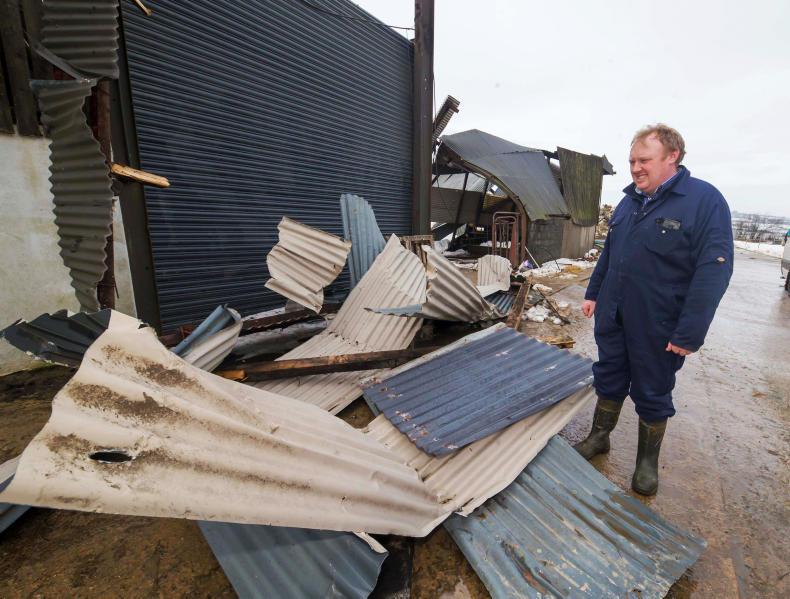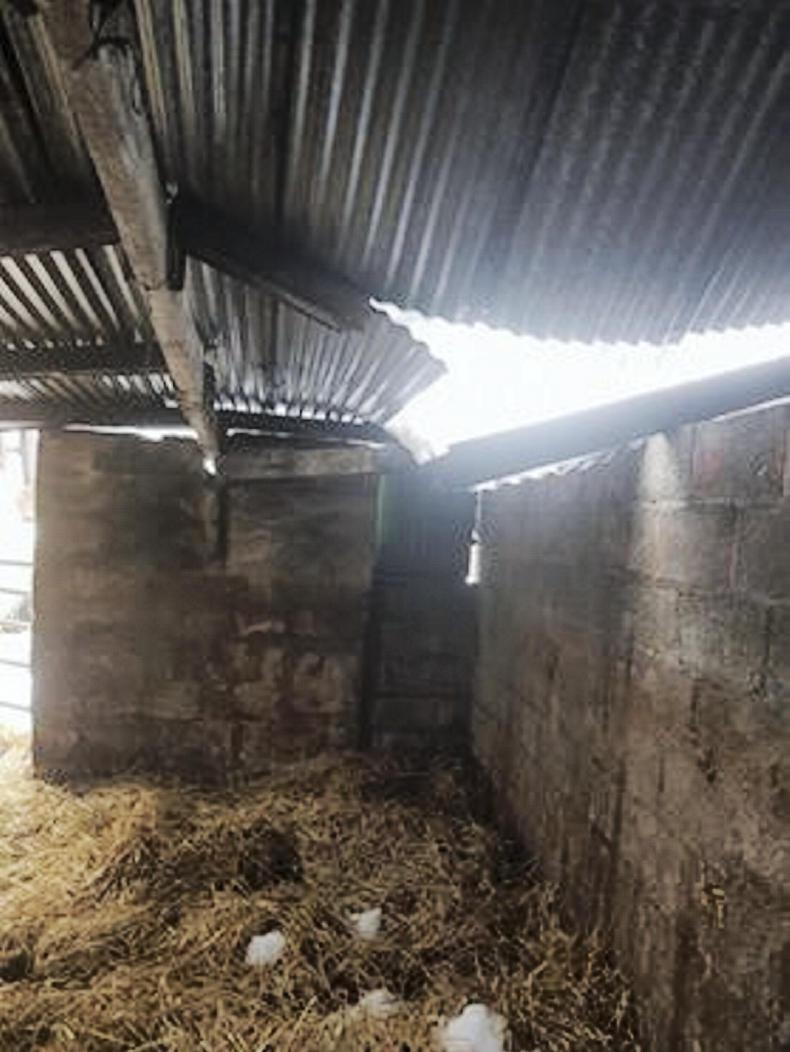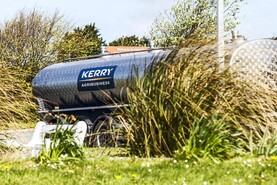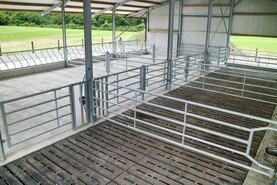As FBD is one of the largest providers of farm insurance, William Conlon sat down with John Cahalan, chief commercial officer, Stewart Gavin, agri product manager and underwriting manager and Jackie McMahon, chief claims manager, to see where farmers stand after the turmoil of the past week.
Listen to "What to do with a shed with storm damage" on Spreaker.
Risk
There are provisions to allow farmers to make emergency repairs to their buildings where necessary, according to Jackie.
“The key point when it comes to making repairs is that if farmers are getting up on roofs themselves there is a real risk of accidents and serious injuries happening. If there are emergency repairs to be made by all means go ahead with them but get a contractor to do it. You don’t have to use one of our contractors but it is important to make sure that they are insured and if you are unsure then contact us and we can check.”
“Before any work is carried out, you need to take photographs and keep any damaged materials so that we can inspect them afterwards but absolutely make necessary emergency repairs,” said Jackie.
Check your policy
What you will be covered for will depend largely on what options you have included under your policy.
“Where you have the storm peril cover for your farm outbuildings this will cover the collapse of a building due to the weight of snow and the vast majority of our customers would have storm cover,” according to Stewart.
“The way our policy is tailored, the option exists for each farmer to select or deselect the various coverages. It’s down to the individual farmer to decide on the level of cover they need for their farm as some will be more risk-adverse than others.
“The insurance farmers can get for their sheds covers storm, fire, lightning and explosion damage. Included in this is the cost of removing the debris which can be substantial. There is also cover for fees relating to the reinstatement of the sheds including architects, surveyors, consultants and legal fees.”
While the majority of farm buildings will be suitable for storm cover, some will not be. This decision will be made by one of the more than 70 site surveyors who will go out and assess the buildings on the farm.
A key issue that farmers need to be aware of when it comes to their farm buildings insurance is the area of underinsurance.
“Out of this event and going forward it is very important that farmers have the adequate insurance in place,” said John. “Thankfully, the majority of farmers would follow the recommendations to review the rebuild values they place on their property, so there are very few cases of undervaluing of properties,” Stewart added.
Dairy equipment cover
If damage has been done to some of your dairy equipment over the past week it may be worth checking your policy to see if the repairs are covered.
“What some farmers may have is an all risks cover for bulk tanks and associated equipment,” Stewart said.
“Frost damage would be included here. In addition, a cover option is also available for loss of milk due to deterioration of milk quality. This would be applicable where there was an electricity outage in an area and where a failure of any thermostatic or automatic controlling devices occurred which led to milk going sour and having to be thrown out.”
“It also covers the pipes and associated equipment that is connected to the bulk tank. In addition to that, if someone has taken out computerised milking equipment cover that too covers frost damage.”
One cover that farmers should be aware of and may be applicable to some farmers over the past number of days relates to loss of income.
“If there was damage to your milking parlour, which was insured on your policy and the damage resulted in a property claim, the additional cost incurred to get equipment in to get cows milked or the loss of income would be a valid claim under this cover option.”
Many farmers encountered issues in relation to collection of milk and subsequent capacity difficulties.
“If the milk lorry cannot access the farm to collect the milk, that is not something that is covered under your farm insurance policy.”
John highlighted that “we continuously review the cover we offer and listen to farmers’ feedback. If demand exists for new insurance solutions to support farming customers we will consider the necessary changes to ensure our customers are fully protected”.
Losses
Other issues that farmers have experienced over the past few days include a loss of livestock and a series of burst pipes throughout yards.
Stewart confirmed that repairs to burst pipes are not covered by the policy. Neither are works if a farmer has to dig up a shed to get to pipes. However, certain cover exists for livestock.
“Storm cover is available for livestock. Flood and electrocution cover is also available. We have also heard of incidents of sheep worrying over the past few days and there is cover available for this. Coming into the springtime, this is one that farmers need to be conscious of.”
When it comes to farmers being covered for damage to machinery, it will depend on the type of policy held by the farmer. However, there is cover available for implements and utensils and farm machinery, with farmers often choosing particular equipment they wish to insure.
One question that farmers will be asking is how long they will have to wait for compensation relating to a claim.
“The majority of straightforward claims we will pay within 10 days of getting the quotation or invoice,” according to Jackie.
“We have a large number of adjusters out on the ground ready to go. Where delays can occur especially in events like this, is getting access to the farm. How quickly we can get a contractor on site to provide a quote can increase the time.”
“The whole area of farm safety is of paramount importance to us so if you are looking to make an emergency repair that people are careful and vigilant and that is a huge issue.
“We want to be out on the farm helping. It is important that farmers take the time to review their cover in light of these types of events and make sure it is adequate going forward. We recognise the hardship that farmers are going through and we will try and settle our claims quickly and fairly, which we have a track record in doing,” John assured.
“If farmers have concerns we would urge them to contact us. We have extended our business opening hours to make ourselves available to farmers during this time.”
“The storm cover question is one that is coming more to the front of farmers’ minds over the past few years,” Jackie added.
“Farmers can look at their policy and make changes mid-term if they feel they are not adequately covered.”
If you have any queries in relation to the storm damage that has occurred on your farm you can contact FBD on 01-761 7617 or contact your local FBD branch to get a local adviser out to your farm.
The Irish Farmers Journal also spoke to Jason Byrne, head of agribusiness at Zurich, to get advice on what farmers should do if sheds were damaged during Storm Emma.
When it comes to making temporary or permanent repairs to sheds damaged during the storm, farmers need to be sure they are not compromising a potential insurance claim.
Some farmers may feel that they are putting a claim at risk if they carry out necessary repairs. Jason was quick to put farmers at ease.
“On the contrary, immediate urgent repairs are in order and encouraged by Zurich in order to aid the farmer mitigate the storm damage and prevent further loss. However, before proceeding, there are a few things the farmer must do,” according to Jason.
“The most important thing for farmers to do before attempting to carry out any repairs is to conduct a rigorous risk assessment to ensure it is safe to proceed. After this is done, they should photograph the damage before beginning the work. Also they should retain damaged elements for a possible follow-up inspection.”
If snow caused the roof of a shed to collapse or if the ice caused pipes and hoses in dairy parlours to burst, would these types of issues be covered by the insurance?
Jason said that, “If as a result of the storm, a farmer has suffered damage to buildings or any other property, provided the customer has either storm or accidental damage cover in place on that building or item of farming equipment, then the claim will be assessed and deemed valid.”
Cost exceeds €2,500
He continued: “Where there has been minor damage to your property (ie where it is estimated that the total cost will not exceed €2,500), you may arrange for the damage to be repaired. However, we would ask you to notify the damage to claimsnotification@zurich.ie with your policy number and contact information. We will register the claim and contact you with your claim number and dedicated handler name.
“Ensure you photograph the damage and retain all invoices and evidence and once your work is complete, email your photographs and all invoices to your handler to enable us to review your claim.
“If your contractor estimates that the total cost of the repairs will exceed €2,500, please immediately contact Zurich on 1890-208 408 or claimsnotification@zurich.ie where we will assist you further. In general for claims above €2,500 we may arrange for a loss adjuster to visit your farm to inspect the damage.
Jason also highlighted some of the key issues that farmers must look out for over the next few days. “If you see any sagging or hear unusual stress noises, take extreme care and call a contractor – don’t climb on to roofs or work at heights to dislodge or remove snow.
“Melting or thawing snow and ice can cause additional hazards such as flooding and electrocution. Switch off electrics at the mains/fuse box if you think melting snow has leaked near electrics or electrical appliances, however if the mains switch is wet or standing in water DO NOT touch it and call a plumber and electrician.
Read more
Feed delivery delays after Storm Emma
21 weanlings killed as snow blown into shed
Farmers advised to disinfect wells after snow
As FBD is one of the largest providers of farm insurance, William Conlon sat down with John Cahalan, chief commercial officer, Stewart Gavin, agri product manager and underwriting manager and Jackie McMahon, chief claims manager, to see where farmers stand after the turmoil of the past week.
Listen to "What to do with a shed with storm damage" on Spreaker.
Risk
There are provisions to allow farmers to make emergency repairs to their buildings where necessary, according to Jackie.
“The key point when it comes to making repairs is that if farmers are getting up on roofs themselves there is a real risk of accidents and serious injuries happening. If there are emergency repairs to be made by all means go ahead with them but get a contractor to do it. You don’t have to use one of our contractors but it is important to make sure that they are insured and if you are unsure then contact us and we can check.”
“Before any work is carried out, you need to take photographs and keep any damaged materials so that we can inspect them afterwards but absolutely make necessary emergency repairs,” said Jackie.
Check your policy
What you will be covered for will depend largely on what options you have included under your policy.
“Where you have the storm peril cover for your farm outbuildings this will cover the collapse of a building due to the weight of snow and the vast majority of our customers would have storm cover,” according to Stewart.
“The way our policy is tailored, the option exists for each farmer to select or deselect the various coverages. It’s down to the individual farmer to decide on the level of cover they need for their farm as some will be more risk-adverse than others.
“The insurance farmers can get for their sheds covers storm, fire, lightning and explosion damage. Included in this is the cost of removing the debris which can be substantial. There is also cover for fees relating to the reinstatement of the sheds including architects, surveyors, consultants and legal fees.”
While the majority of farm buildings will be suitable for storm cover, some will not be. This decision will be made by one of the more than 70 site surveyors who will go out and assess the buildings on the farm.
A key issue that farmers need to be aware of when it comes to their farm buildings insurance is the area of underinsurance.
“Out of this event and going forward it is very important that farmers have the adequate insurance in place,” said John. “Thankfully, the majority of farmers would follow the recommendations to review the rebuild values they place on their property, so there are very few cases of undervaluing of properties,” Stewart added.
Dairy equipment cover
If damage has been done to some of your dairy equipment over the past week it may be worth checking your policy to see if the repairs are covered.
“What some farmers may have is an all risks cover for bulk tanks and associated equipment,” Stewart said.
“Frost damage would be included here. In addition, a cover option is also available for loss of milk due to deterioration of milk quality. This would be applicable where there was an electricity outage in an area and where a failure of any thermostatic or automatic controlling devices occurred which led to milk going sour and having to be thrown out.”
“It also covers the pipes and associated equipment that is connected to the bulk tank. In addition to that, if someone has taken out computerised milking equipment cover that too covers frost damage.”
One cover that farmers should be aware of and may be applicable to some farmers over the past number of days relates to loss of income.
“If there was damage to your milking parlour, which was insured on your policy and the damage resulted in a property claim, the additional cost incurred to get equipment in to get cows milked or the loss of income would be a valid claim under this cover option.”
Many farmers encountered issues in relation to collection of milk and subsequent capacity difficulties.
“If the milk lorry cannot access the farm to collect the milk, that is not something that is covered under your farm insurance policy.”
John highlighted that “we continuously review the cover we offer and listen to farmers’ feedback. If demand exists for new insurance solutions to support farming customers we will consider the necessary changes to ensure our customers are fully protected”.
Losses
Other issues that farmers have experienced over the past few days include a loss of livestock and a series of burst pipes throughout yards.
Stewart confirmed that repairs to burst pipes are not covered by the policy. Neither are works if a farmer has to dig up a shed to get to pipes. However, certain cover exists for livestock.
“Storm cover is available for livestock. Flood and electrocution cover is also available. We have also heard of incidents of sheep worrying over the past few days and there is cover available for this. Coming into the springtime, this is one that farmers need to be conscious of.”
When it comes to farmers being covered for damage to machinery, it will depend on the type of policy held by the farmer. However, there is cover available for implements and utensils and farm machinery, with farmers often choosing particular equipment they wish to insure.
One question that farmers will be asking is how long they will have to wait for compensation relating to a claim.
“The majority of straightforward claims we will pay within 10 days of getting the quotation or invoice,” according to Jackie.
“We have a large number of adjusters out on the ground ready to go. Where delays can occur especially in events like this, is getting access to the farm. How quickly we can get a contractor on site to provide a quote can increase the time.”
“The whole area of farm safety is of paramount importance to us so if you are looking to make an emergency repair that people are careful and vigilant and that is a huge issue.
“We want to be out on the farm helping. It is important that farmers take the time to review their cover in light of these types of events and make sure it is adequate going forward. We recognise the hardship that farmers are going through and we will try and settle our claims quickly and fairly, which we have a track record in doing,” John assured.
“If farmers have concerns we would urge them to contact us. We have extended our business opening hours to make ourselves available to farmers during this time.”
“The storm cover question is one that is coming more to the front of farmers’ minds over the past few years,” Jackie added.
“Farmers can look at their policy and make changes mid-term if they feel they are not adequately covered.”
If you have any queries in relation to the storm damage that has occurred on your farm you can contact FBD on 01-761 7617 or contact your local FBD branch to get a local adviser out to your farm.
The Irish Farmers Journal also spoke to Jason Byrne, head of agribusiness at Zurich, to get advice on what farmers should do if sheds were damaged during Storm Emma.
When it comes to making temporary or permanent repairs to sheds damaged during the storm, farmers need to be sure they are not compromising a potential insurance claim.
Some farmers may feel that they are putting a claim at risk if they carry out necessary repairs. Jason was quick to put farmers at ease.
“On the contrary, immediate urgent repairs are in order and encouraged by Zurich in order to aid the farmer mitigate the storm damage and prevent further loss. However, before proceeding, there are a few things the farmer must do,” according to Jason.
“The most important thing for farmers to do before attempting to carry out any repairs is to conduct a rigorous risk assessment to ensure it is safe to proceed. After this is done, they should photograph the damage before beginning the work. Also they should retain damaged elements for a possible follow-up inspection.”
If snow caused the roof of a shed to collapse or if the ice caused pipes and hoses in dairy parlours to burst, would these types of issues be covered by the insurance?
Jason said that, “If as a result of the storm, a farmer has suffered damage to buildings or any other property, provided the customer has either storm or accidental damage cover in place on that building or item of farming equipment, then the claim will be assessed and deemed valid.”
Cost exceeds €2,500
He continued: “Where there has been minor damage to your property (ie where it is estimated that the total cost will not exceed €2,500), you may arrange for the damage to be repaired. However, we would ask you to notify the damage to claimsnotification@zurich.ie with your policy number and contact information. We will register the claim and contact you with your claim number and dedicated handler name.
“Ensure you photograph the damage and retain all invoices and evidence and once your work is complete, email your photographs and all invoices to your handler to enable us to review your claim.
“If your contractor estimates that the total cost of the repairs will exceed €2,500, please immediately contact Zurich on 1890-208 408 or claimsnotification@zurich.ie where we will assist you further. In general for claims above €2,500 we may arrange for a loss adjuster to visit your farm to inspect the damage.
Jason also highlighted some of the key issues that farmers must look out for over the next few days. “If you see any sagging or hear unusual stress noises, take extreme care and call a contractor – don’t climb on to roofs or work at heights to dislodge or remove snow.
“Melting or thawing snow and ice can cause additional hazards such as flooding and electrocution. Switch off electrics at the mains/fuse box if you think melting snow has leaked near electrics or electrical appliances, however if the mains switch is wet or standing in water DO NOT touch it and call a plumber and electrician.
Read more
Feed delivery delays after Storm Emma
21 weanlings killed as snow blown into shed
Farmers advised to disinfect wells after snow






 This is a subscriber-only article
This is a subscriber-only article











SHARING OPTIONS: